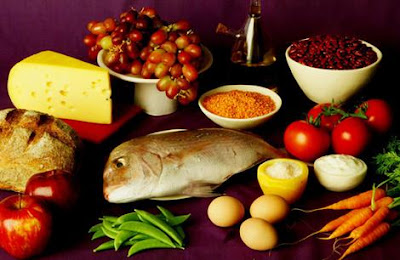 Here are some quick tips to increase your metabolism to increase muscle mass and gain weight in a healthier way:
Here are some quick tips to increase your metabolism to increase muscle mass and gain weight in a healthier way:1. Eat 6 small meals through out the day
This is one of the most important things if you want to increase your weight. Eating small meals throughout the day will help your body to absorb the nutrients properly and digest the food properly.
2. Portion size
There is a common myth that fats are not good for health. There are certain type of fats those are good for your health. You must eat a variety of food at the same time and your diet should include good sources of fats like Fish and Linseed oil.
Calculate your daily calorie requirements and make sure you exceed those limits if you want to gain weight. The ratio for Carbohydrates, Protein and Fat should be 4:4:2 respectively. This will help your body get all essential nutrients.
3. Protein Intake
Do not take excessive protein, the body will absorb only as much as is required. To increase the requirement of your protein intake you must exercise and lift weights. Natural sources of protein are better than those powders that are very expensive and have the same benefit as their alternatives.
Sprouted legumes are great sources for protein and other important minerals. If you are a vegan bodybuilder than sprout can be called your alternative to egg. It has great health benefits; it increases your weight and also helps to build up your immune system.
4. Resistance training
Weight lifting whether in the gym or at home can do wonders. Try to do it three days in a week. This will help the body to recover from the damage on the exercise days. Oil massage can help in fast recovery.
The good old school exercises like lifting dumbbells and barbells alone can help you get what you want. Push-ups and pull-ups can help you get your body in shape and while at cutting phase it can improve your results. Squats are important for endurance and increasing metabolism of the whole body and improving leg shape.
5. Avoid Cardiovascular
Avoid jogging and running for long hours. Have you seen any marathon runner who is not skinny? Running is a cardiovascular exercise that burns the fat and muscle in the body. However do not stop doing cardiovascular altogether. It is important for the body to function well. Try to do cardiovascular twice a week and make sure that it does not lie on the same day as weight training.
Swimming is another good cardiovascular exercise, but try not to do it for a longer period of time. It will not help your body in gaining weight.
6. Running on stairs
Running stairs and climbing mountains is one of the best exercises to boost your metabolism. If you have a higher R.M.R. (resting metabolic rate) chances are that you will absorb more nutrients and build up body tissues resulting into increased body weight.
Again try to do this type of exercise only once a week. It can also be helpful if you want to have sharp cuts of muscles in the body.
7. Herbs
Herbs as supplement can help your body recover through the damage easily. Herbs like ginseng those are found in ancient system of medicine can help you in increasing your metabolism and gain power.
These herbs have virtually no side effects. However you should make sure that you consult your doctor before consuming any of these. Make internet your friend and research what type of herbs would be beneficial for you.
8. Rest and recover
Resting is as important as doing the exercise. Your body needs a break after a tiring workout. Try to have a gap of at least 48 hours to get enough rest your body needs. Early to bed and early to rise makes a man healthy, wealthy and wise.
9. Stop Worrying
This is scientifically proven facts that worry and curry is the cause of most of the diseases. Stop being worried about anything. This will not help you in any way. The best way to fight anxiety and worry to stand up and do something against it. The body wants to react to the problem it is facing and if you do not do anything you are in a way suppressing the urge to fight. This can lead to disturbed metabolism and losing good muscles. So indulge into activities that will help you in being happy and worry free. Do not be worried about small problems in life.
10. Calorie intake
Measure your calorie intake. This is another very important thing in your journey to weight gain. Make sure you eat more than your calorie requirement. This will help your body to absorb those extra proteins and nutrients to build up more muscle mass.
Extra Tip: If you ever hit the plateau take a long gap between your exercise days and then kick start again. Remember that without resistance training you will not see the results.














